Are Vegan Diets Safe For Kids?
Table of Contents
1. Understanding the Safety of Vegan Diets for Children
2. What Do I Eat on a Vegan Diet?
3. How Can Vegan Meal Delivery Support Weight Management?
4. How Can I Eat Healthy Without Cooking?
1. Understanding the Safety of Vegan Diets for Children
When it comes to dietary choices, it's essential to consider the nutritional needs of children, especially when adopting a vegan diet. A vegan diet excludes all animal products, making it rich in fruits, vegetables, legumes, and whole grains, but it can potentially lack essential nutrients like Vitamin B12, calcium, omega-3 fatty acids, and iron. Therefore, it's crucial to plan and execute a vegan diet for kids carefully, ensuring they get all the nutrients they need for healthy growth and development. Consultation with a dietitian or nutritionist is often recommended to ensure a balanced and nutrient-rich meal plan. Moreover, introducing a variety of foods and incorporating fortified foods or supplements can help meet the nutritional needs of vegan children. It's also important to educate kids about nutrition and encourage a positive attitude towards food. Ultimately, while a vegan diet can be a healthy choice for kids, it requires careful planning and monitoring.
Order fresh salads today →


2. What Do I Eat on a Vegan Diet?
A vegan diet offers a wide variety of plant-based foods, far beyond simple salads or steamed vegetables. Staples of vegan meals include legumes, whole grains, nuts, seeds, fruits, and vegetables, which together provide balanced macronutrients and essential vitamins. Protein sources include chickpeas, lentils, tofu, tempeh, and seitan, while healthy fats come from avocados, nuts, and seeds. Vegan meal delivery services take these ingredients and transform them into flavorful dishes such as vegan curries, grain bowls, pasta, and tacos. These services also ensure variety by offering global-inspired flavors and seasonal produce, keeping meals exciting and satisfying. With vegan meal delivery, customers can enjoy a diverse range of delicious, plant-based meals without repetitive menu choices or time-consuming preparation.
Choose your salads and schedule delivery →
3. How Can Vegan Meal Delivery Support Weight Management?
Vegan meal delivery services play a significant role in supporting weight management goals through portion control and nutrient-dense ingredients. Plant-based meals are naturally high in fiber, which promotes satiety and prevents overeating. Proteins from tofu, chickpeas, and lentils offer sustained energy, while complex carbohydrates from grains provide long-lasting fullness. Vegan meal delivery services offer calorie-counted meals tailored to weight loss or maintenance goals, removing the need for tracking or guesswork. Additionally, avoiding overly processed vegan junk food ensures meals remain aligned with health objectives. By offering pre-measured, balanced meals, vegan meal delivery supports sustainable weight management while maintaining variety and satisfaction.
Get fresh salads and snacks delivered →
4. How Can I Eat Healthy Without Cooking?
Inspired Go eliminates the need for time-consuming meal prep and cooking while still delivering healthy, delicious vegan meals. With pre-prepared dishes crafted by expert chefs and dietitians, Inspired Go ensures every meal meets high nutritional standards without requiring any effort from the customer. Their ready-to-eat vegan meals are delivered fresh, packed with balanced ingredients, and portioned to support consistent nutrition. Customers can simply unpack, serve, and enjoy their meals without worrying about chopping vegetables, measuring portions, or cleaning up afterward. Inspired Go’s vegan meal delivery provides a seamless solution for busy individuals, professionals, or anyone seeking a healthier lifestyle without the time investment of traditional cooking. Eating healthy has never been more convenient, accessible, or enjoyable.
Try our fresh, ready-to-eat salads →
Frequently Asked Questions
The key difference between vegan and vegetarian diets lies in the exclusion of animal products. Vegetarians avoid meat, poultry, and fish but may consume animal-derived products like eggs, dairy, or honey. Vegans, on the other hand, exclude all animal products, focusing solely on plant-based foods. Veganism is often a lifestyle choice, avoiding animal products in all forms, including clothing and cosmetics.
A vegan diet consists entirely of plant-based foods, including fruits, vegetables, grains, nuts, seeds, and legumes. It excludes all animal-derived products, such as meat, fish, dairy, and eggs. This diet emphasizes nutrient-dense, whole foods, though processed vegan alternatives are available. A vegan diet, when well-balanced, supports good health and environmental sustainability, making it popular for ethical, health, and ecological reasons.
Not all vegan diets are gluten-free. While veganism excludes animal products, gluten is a protein found in wheat, barley, and rye, which are plant-based and commonly included in vegan meals. To maintain a vegan and gluten-free diet, focus on naturally gluten-free foods like fruits, vegetables, rice, quinoa, and gluten-free grains. Always check labels for hidden gluten in processed vegan foods.
On a vegan diet, you can enjoy a wide variety of plant-based foods, including fruits, vegetables, legumes, nuts, seeds, whole grains, and plant-based dairy alternatives. Popular vegan dishes include stir-fries, salads, grain bowls, soups, and curries. Incorporating fortified foods or supplements ensures you meet nutrient needs like B12, iron, and omega-3s, making the diet balanced and enjoyable.
A vegan diet can be very healthy when balanced and diverse. It’s rich in fiber, vitamins, and antioxidants, while being lower in saturated fat and cholesterol. These factors contribute to better heart health, weight management, and reduced risk of chronic diseases. However, careful planning is essential to ensure adequate intake of nutrients like vitamin B12, iron, and protein for overall health.

